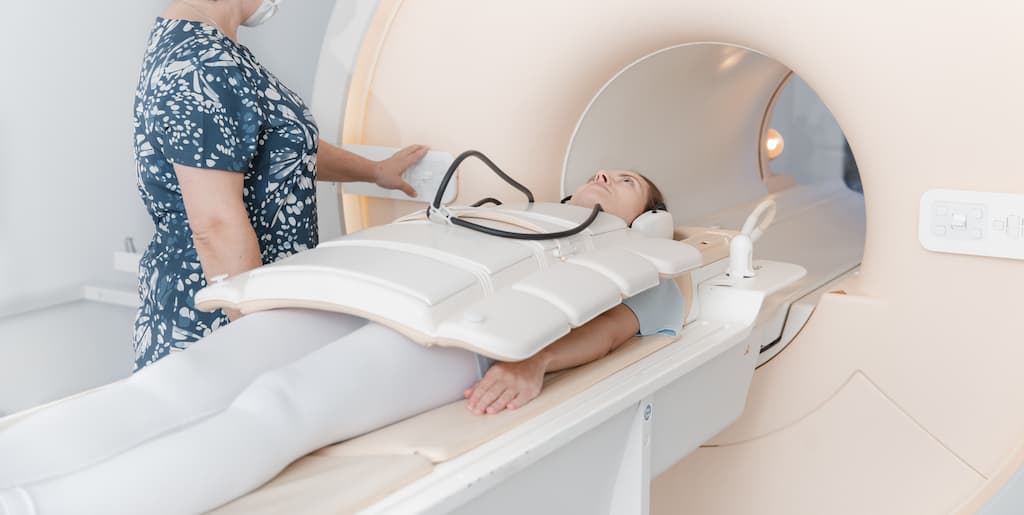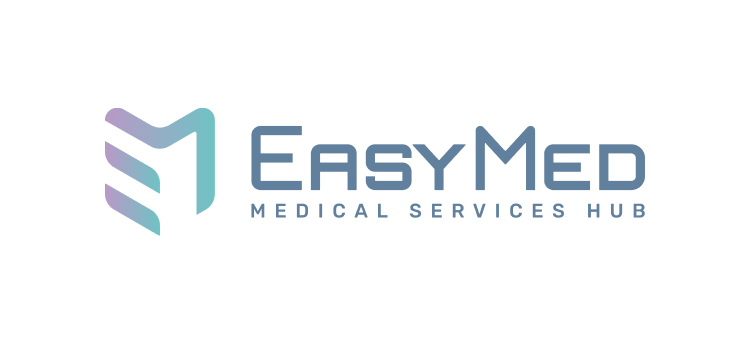
Magnetic resonance imaging of the spine
Magnetic resonance imaging of the spine (MRI) is a modern non-invasive diagnostic method that allows you to obtain accurate images of the spine and surrounding tissues. This method is essential for the timely detection and effective treatment of many spinal diseases.
Дополнительные процедуры:
- Лабораторный анализ мочи
- Элемент списка #2
- Элемент списка #3
MRI of the spine with EasyMed
EasyMed is your reliable assistant that offers services for choosing the optimal conditions for an MRI of the spine in Israel. We take care of all organizational aspects, including finding the most convenient clinic and accompanying clients at all stages – from applying to receiving the examination results.
EasyMed’s team of specialists provides quick access to the MRI procedure in the best medical institutions in Israel, which is especially important for timely diagnosis and treatment.
What does MRI of the spine show?
MRI of the spine can effectively detect a variety of diseases and conditions, including:
- Degenerative changes such as osteochondrosis or herniated discs.
- Pathologies such as spondylitis or spondyloarthrosis.
- Spinal injuries, including fractures and their consequences.
- Inflammatory diseases such as myelitis.
- Spinal tumors and metastases.
MRI of the spine provides a comprehensive view of the condition of the spinal column, which is critical for accurate diagnosis and treatment planning.
Indications for MRI of the spine
MRI of the spine is recommended for a variety of symptoms and conditions that may indicate spinal problems:
- Persistent or intermittent back pain.
- Limited mobility and discomfort in the spine.
- Suspicion of herniated or protrusion of the intervertebral discs.
- Symptoms related to nerve roots, such as numbness or tingling in the extremities.
- Suspicion of inflammatory or tumor processes in the spine.
Important! Before the MRI examination, the patient must be provided with a complete medical history and a referral from the doctor. This will provide a more accurate diagnosis and allow the doctor to determine the most appropriate scan parameters. In addition, it will help specialists interpret the MRI results correctly, taking into account the patient’s individual characteristics and medical history. This increases the accuracy of diagnosis and the effectiveness of subsequent treatment.
Preparation for the procedure
- Before the MRI, the patient needs to remove all metal objects: jewelry, watches, etc. This also applies to metal objects in clothing.
- The patient must remove all electronic devices, removable medical devices, hearing aids, and dentures if they can be pulled out.
- The doctor should be informed about claustrophobia and allergies, especially to contrast, if any.
- It is important to provide a complete history and referral from a doctor to ensure the most accurate diagnosis.
These precautions will help ensure the safety and accuracy of the MRI procedure. In the case of an MRI scan with a contrast agent, the patient may need additional preparation.
Important! An EasyMed specialist will additionally notify the patient of the necessary actions and restrictions before the procedure before the MRI.
The process of performing an MRI of the spine
The MRI procedure of the spine begins with the preparation of the patient. Then it is placed on the CT table and the head is fixed to avoid unnecessary movements. It is important to remain still during the scan. The tomograph starts working when the table with the patient has completely moved into the machine.
The process can take about 30 minutes, depending on the examined area. Patients may be asked to use earplugs because of the loud noises made by the machine.
If the patient is scheduled for an MRI with contrast, the procedure time will increase to approximately 60 minutes. The contrast agent is injected intravenously before the procedure. It allows you to study the spine’s condition in more detail, providing better visualization of specific areas. This is especially important in the diagnosis of tumors and inflammatory processes.
The entire process, including preparation and the scan itself, can take up to 1.5 hours. Once the procedure is complete, the patient can leave the medical facility immediately unless further follow-up is required.
MRI of the spine with contrast medium
Magnetic resonance imaging of the spine with a contrast medium uses special contrast injected intravenously to improve the visualization of critical spine structures. The contrast agent significantly improves the clarity of images, allowing a more detailed examination of various tissues, including intervertebral discs, the spinal cord and its membranes, and blood vessels.
The procedure is recommended in the following cases:
- For detecting and evaluating spinal tumors, including primary and metastatic tumors. Contrast improves the visualization of their size, shape, and distribution.
- To diagnose inflammatory diseases of the spine, including spondylitis and myelitis.
- To detect vascular abnormalities in the spine, such as aneurysms or other blood vessel abnormalities.
Important! The contrast agent used in a spine MRI is safe for most patients. However, before the procedure, it is necessary to inform the doctor about any allergies, especially to contrast and any kidney disease, since the contrast is excreted through the renal system.
Contraindications
Magnetic resonance imaging of the spine is a safe and non-invasive diagnostic method. However, there are certain conditions where MRI may be undesirable or impossible. These constraints fall into two categories: relative and absolute.
Relative contraindications:
- Claustrophobia: Patients who suffer from a fear of confined spaces may experience anxiety or discomfort during the procedure in a closed-type MRI machine.
- Pregnancy: In the first three months of pregnancy, MRI is recommended only for strict indications, as there is a theoretical risk to the development of the embryo.
- Cochlear Implants: Some types of these implants may be sensitive to the strong magnetic field used in MRI.
Absolute contraindications:
- Electronic Implants: The magnetic field of MRI can damage or disrupt pacemakers and other electronic devices.
- Metal Implants & Clips: Metal elements in the scanning area are particularly dangerous, as they can heat up or move around, causing injuries.
- Patient's body weight: MRI scanners usually have a weight limit, usually up to 150-200 kg.
Additional Limitations of Using Contrast
- Allergic reactions: Patients with allergies to contrast agents should inform their doctor before the procedure.
- Renal function: Since the kidneys usually excrete contrast, patients with impaired renal function should undergo the procedure under strict medical supervision.
Safety of the procedure
Magnetic resonance imaging of the spine is a safe diagnostic method that does not involve ionizing radiation, unlike X-rays and CT scans. Thanks to a magnetic field and radio waves, MRI minimizes the risks associated with radiation exposure, making the procedure safe even with frequent passages. Rare side effects can occur when using a contrast agent, but they are usually easily controlled by specialists.
The frequency of MRI of the spine is determined individually, depending on the medical indications and the patient’s state of health. For patients with chronic spinal diseases or those on long-term treatment, MRI can be performed regularly to monitor the disease’s dynamics and assess the therapy’s effectiveness.
Doctors approach the appointment of MRI taking into account the individual characteristics of each patient, which ensures maximum safety and efficiency of diagnosis.
EasyMed – Your Diagnostic Partner
By using the services of EasyMed for the organization of spine MRI, you get a guarantee of fast and comfortable service. We carefully select the best medical centers in Israel, considering the unique requirements and urgency of each of our client’s needs.
EasyMed eliminates the need to search for a suitable clinic and wait in line for specialists. We offer assistance in booking treatments and prompt interpretation of the results. If necessary, we will arrange additional consultations and inspections.
EasyMed’s team of professionals accompanies you every step of the way, from when you submit your application to when you receive your results, providing easy access to high-quality medical care in Israel.
Want to make an appointment for a review?
Fill in the following details
and we will contact you as soon as possible
Faq
Frequently asked Questions
We provide personalized healthcare services. Our main goal is to provide you with a quick appointment for the necessary medical examination or consultation with a doctor.
There is no need to wait several months: with us you will get to the right specialist in the shortest possible time.
Waiting times depend on the complexity of the procedure and the doctor’s profile. We can make an appointment with some specialists within 24 hours. For complex procedures, the waiting period of which reaches several months, you will be treated with us within 2-3 weeks.
There are a number of procedures (for example, complex types of MRI) that the patient can wait about a year and a half. We can reduce this period to 3 months.
We cooperate with leading specialists in various fields, as well as with top clinics and laboratories throughout Israel and abroad.
Our doctors use the latest treatment protocols and the most advanced technologies. The clinics we work with are equipped with modern equipment that provides the most accurate results.
Our partners are experienced professionals who have earned trust due to their experience, knowledge and professionalism.
We operate in all regions of Israel. Your appointment will be scheduled at the location most convenient for you.
The cost of services depends on the complexity of the procedure and the doctor’s profile. For accurate information and cost calculation, leave your details or call: 033083020
Yes, absolutely. Confidentiality and protection of our clients' personal information is one of our key priorities. We strictly adhere to all legal and ethical standards to ensure the maximum security of your data.
Our specialists will check whether in a particular case a refund from the insurance company is due. If yes, then after completing the procedure, a receipt will be sent to the insurance agent, who, in turn, makes a request to the insurance company to return the amount due to the patient for the procedure completed.



